- Home
- Nancy Means Wright
Mad Season Page 11
Mad Season Read online
Page 11
The cow turned a wary eye on him, flicked her tail. A fluff of hay flew in his face and he coughed.
“Allergic?”
He moved back a step in case Jane decided to relieve herself.
She laughed out loud. The laugh lit up her face, took off years. Though the lines were there, even in the dim-lit barn: the past week had hurt. He was glad he’d come, she needed the support. Her kids had their own lives, they wouldn’t help that much, except to keep her busy, worried, frustrated.
He told her about his meeting with Carol Unsworth.
“What did you think of her?” she asked. They were leaning against Jane’s stall, like it was a natural place for friends to meet (he’d started to think lovers and slapped his hip).
“Nice lady,” he said. “I think “lady” is the word. The sheep look well cared for. Tell me about your visit.”
“Oh, we had coffee and cookies. I was angry when I went there, to talk about school. Her son was one of the ringleaders.”
“You mentioned that.”
“I was mad, but I calmed down. She made me. She was nervous too. She seem nervous with you?”
“Yeah, I was going to say that. She kept fluttering her eyelashes.”
She didn’t smile. “Why did you go, really? Because of Wilder’s connection to Emily?”
“Basically, yes. I was there to see Wilder, but he didn’t have much to say. But I found something interesting.”
This time Jane Eyre lifted her tail, and Ruth said, “Oh,” and they moved away from the stanchion. Outside the barn, standing in two inches of muddy snow, he told her about the raffle tickets. “A pile of them. Mama bought what son couldn’t sell.”
“Wilder?”
He thought of the liaison with Emily. Besides, Kurt might have been lying. “The older one. Works at Catamount Furniture.”
“Oh. I know about him. The druggie. Emily told me. One of the reasons the family came to Vermont. You think he’s connected?”
He said, “We have to look at everyone, Ruth. Kurt says Wilder sold the tickets to the Larocques. We have to look into that.”
“Ask him. Sounds innocent enough.”
“I hope so.” He saw her lips press together. “I thought you could ask him.”
“Maybe. It’s delicate. Or get Emily to.”
She came back to the fact of the traded car, the only tangible in hand. “That’s good news, anyway. It means the man was guilty, trading in cars like that. Though he must have known he’d be checked on, as you say. I suppose he’ll keep trading?”
“Possible. Latest car is six years older. He may just abandon it, buy another. So we’re checking everything. Police, FBI. They’re alerted across the country, Canadian border.”
There was a silence. He saw how attractive she was, even in her muddy shirt. Her neck was palest pale. Celtic skin, he’d read, was especially vulnerable to sun—to feeling, too, maybe. The blood was reddening her nose, or maybe it was the damp air. Anyway, he had to smile. In a minute he’d be ear to ear. He coughed again.
“Got any coffee in that kitchen of yours?” he asked. “I mean, I’ll make it if you don’t.”
She looked confused and said, “Oh, sure, I should have offered. Popovers, too. That is, maybe. Vic’s home.”
“I’ll take my chances.” He followed her up to the house, stamping the manure off his feet into the snow. He guessed he needed a shower more than a popover.
She turned by the porch. “Plattsburgh?” she said. “A used-car lot in Plattsburgh? That’s where that broker comes from. I have her card. Plattsburgh, it said.”
He tripped on the porch step, thinking about that.
* * * *
Tim asked, “Anything else you want done?” and Lucien shook his head.
Cows milked, barn swept, nothing for it but to face another night. He might have said to the fellow, “Toddy? Come in then,” but his tongue wouldn’t wrap around the words. Lucien wanted company and he didn’t. What he really wanted was up there on the hill. Willmarth’s hired man was hardly Belle. Mother of God, hardly!
The beagle Marie got him nipped at his heels, and he pushed it away with a foot. He told Marie he didn’t want no other dog after Raoul, but she went and got it anyway. He refused to give it a name, just called it Dog.
But then when Tim was gone, his squarish back moving across the field toward Willmarth’s, he wanted to call him back. Maybe he would like company.
“Tim?” Heard his voice, croaking like an old frog.
But too late. Tim kept going. He allowed the dog to come in the house with him anyway. He locked himself in every night now since Belle’s death. It was getting familiar, pushing the bolt. He’d filed off the rust, it worked all right. He yanked the shades— Belle’d put them up, he laughed when she did it: “Don’t want heifers seeing you in your nightgown, woman?” But he was glad of them. Never thought he would be, but he was. He went to the Kelvinator for ice, tray was all crusty, poured himself a drink. It was Marie’s husband brought him the rum. Just handed it to him in a bag, wouldn’t look him in the eye. Drank, Harold, but held it, up to a point. Heard him sound off once or twice, mostly about farms. They smelled bad, he said. Well, that was all right, each to his own. No, himself he never drank much. Just a beer off and on.
But there was something in it, he saw why they did it. After the first jolt, the lip pucker, went down smooth, better than any hot plaster on the chest.
He sat down opposite Belle’s chair and then pulled himself up again, turned his rocker around to face the shaded window. God, he had to get used to this “alone” thing. Dog wasn’t gonna help, he saw that, just sitting there by an empty dish. There was a French-speaking station out of Montreal and he got up to turn on the radio. But it was all talk and he switched it off. Ear didn’t pick up French the way it used to, as a boy.
Anyways, with the radio going he couldn’t hear. He needed to hear. Loose branch rapping the window, more like a trap sound, trap, trap trap, he’d cut it down tomorrow. If someone came he wanted quiet, wanted warning. He went over to the corner, got his stick. It didn’t help much that night, but then the other got to it first. When he had his stick he felt okay. It wasn’t gonna happen again. No one gonna get him off guard, by Jesus, get him again, his money. Christ, how he slaved for that money!
He sank back in the chair, red braided mat Belle made, and sipped his rum. If he fell asleep it was all right, he was ready for them. He took a long swallow, it trickled down to his toes—not quite, he had cold feet, poor circulation, Belle used to rub them, they’d never warm up for all the rum.
After a while he got so he didn’t start every time the tree branch trapped on the window.
Just every other time.
* * * *
Ruth didn’t walk him to the door afterward, she realized that after the Horizon started up in the driveway. It seemed a long time before he actually pulled out, like he was sitting there, contemplating the stars, up over the silos. Something like a small rain showered through her and she crossed her arms hard across her chest. It was ridiculous, she was acting like a schoolgirl, she should stick to realities.
“Out,” she said to the thought, “out.” He was only doing his self-appointed work, thought she might remember something, give them another clue, that was why he came. Good Lord! There were two murders in her life, a defected husband, a troubled child upstairs. How much could a woman take?
“Vic?” she called at the foot of the stairs, “Vic?”
There was no answer. She climbed the steps and found him in his room, bent over his homework. He didn’t look up when she went in, she saw he was drawing a map. “Of what?” she asked, “where?” Her voice came out loud, bright, she made an effort to be cheerful, make out that life was normal, in spite of two murders. Of course Vic knew it was a charade.
“Australia,” he said and bore down with a yellow pencil.
Australia, she thought, Australia, where nothing really new had happened—had it?—since the lan
ding of the convicts in the eighteenth-century? Eastern Europe had exploded out of the Communist yoke, the old Yugoslavia was cannibalizing itself; China was still groaning under the old guard, Africa dying of AIDS, South America in the yoke of drug kings. And her son was drawing a map of Australia.
It was wonderful, somehow. Pick a peaceful country, pretend. Pretend, while you’re young.
“I’ve always wanted to go there,” she said, “see those furry koalas. You had a koala when you were little, you remember that? I think it was Mimi gave it to you. She went there, you know, when granddaddy was alive.”
“It wasn’t Mimi,” he said, speaking of his mother’s aunt. “It was Aunt Bertha. Daddy told her to give it to me.”
“Oh.” Bertha always did Pete’s Christmas shopping for him and attributed it to “Daddy.” She wondered if Bertha was buying Pete’s gifts for the new woman this year. Did she have a name, this new woman? Oh, yes, one of those popular names, Dawn or Dew-drop or something. Ruth didn’t care to remember.
“Tell me about Australia,” she said to Vic, and he recited what he’d learned in school. About the climate: desert in the western half, wet jungle in the north; population: 19,508,186 (excluding aboriginals); chief animals: the kangaroo and platypus.
“Any cows?”
“Mostly sheep,” he reported. “They got ‘em in the outback. I might go there one day and help shear. They live like cowboys. I saw that movie.”
She’d forgotten the name, something about a crocodile. They’d seen it together on a rare Saturday night out, she and Pete and Vic. Laughed all the way through. They’d had fun together now and then, the three of them.
“Maybe we should have sheep here,” she said.
His face was long and pointed in the lamplight, the chin looked shadowy, like she could see through to the beard that would soon emerge, too soon. She put a hand on the shoulder and thought it trembled. He didn’t respond about the sheep.
“Maybe we could, in a small way,” she said again. “You could have your own lambs, would you like that?”
“My own?”
“If you take care of them. Just two. Boy and girl?” she suggested slyly, and heard his soft giggle.
She lifted her hand from his shoulder, saw him shiver slightly. Moved across the room to inspect the bed: plaid comforter up over the crumpled sheets, pillow case dragging on the floor. Motherly things were called for in times like these. They were mother and son. There was that fierce animal love.
“Why not sheep?” she shot back over her shoulder. When she turned back he’d finished the map, was shoving it into an orange folder. “Guess I’ll go to bed now,” he said without expression, and she knew she was dismissed.
She didn’t shut the door all the way, it cracked open again, needed fixing like more things in the house than she could count. She’d let the house go to concentrate on the farm. But Vic didn’t say anything, he’d left it open every night since Willy’s death, and she understood.
“Holler when you’re ready for bed,” she said, and he said, “Okay,” and she went down the scuffed steps, hand balanced on the wall. Pete never got around to installing a railing.
The telephone was ringing. She was glad of that, it was a connection with the world. Vic was safe in his room, Emily with Wilder (safe? Colm had her worried now), Sharon home with her baby—what was there to worry about?
Still, her fingers trembled to pick up the receiver.
The voice was high and sweet, like a little girl’s: “Carol Unsworth, Ruth. I know it’s late, but I wanted to catch you before morning. I want to have a few kids over after school tomorrow. I thought maybe Vic would come. I’d pick them up myself. Getting to know each other on a one-to-one might help ...”
The voice drifted off, low, apologetic for having called so late.
“Oh. Thanks. Well, I’d have to ask Vic. He’s in bed now.” She felt annoyed, for some reason. Though it was nice of Carol, thoughtful, of course.
“You can let me know before school’s over. Actually, I have to go out your way tomorrow. I could stop by. I mean, I’d like to see your setup. I was thinking, I saw a small farm for sale, couple of miles down your road. Maybe I could interest George.”
Voice trailing off again, knowing she’d never interest him, Ruth thought. She knew the farm Carol was talking about, either selling or turning into development. She’d wanted it sold as a farm herself, didn’t want a bunch of condos rising up there, cars rushing down her road, city people.
But now she was sounding prejudiced. There were fine, sensitive people, too, wanting, needing out of the city. She had to remember that. It could have been her, moving up here, following some kind of gleam.
She heard herself inviting Carol to stop by—what else could she do? “Not before nine,” she warned.
But Carol had her sheep, anyway. “Could you get away to look at this farm with me? It’s all a pipe dream, I guess, and here we’ve just bought this place.”
Finally, she hung up.
“Vic?” Ruth called, climbing the stairs again, feeling her legs lighter this time, “that was Mrs. Unsworth on the phone, she wants you to come after school for a get-together with her son— Garth? You don’t have to, of course,” she added when there was no answer (water was running in the bathroom). “Vic? Did you hear me?”
She stood outside till the water stopped running.
At last he said, “I heard you.”
* * * *
The woman entered Poore’s Country Properties where Colm shared an office with two others, and asked for Colm. He’d called her, Esther Dolley said, loud, confident: she was busy, but she happened to be coming this way, took a chance.
She could open a can, he thought, with those fingernails. They were false, he supposed, stuck on. Was that an indication of personality? “I’m looking for an office,” she said, her voice at odds with the nails. “Rents are high here.”
“Maybe.” He felt small enthusiasm for this woman, wouldn’t intercede with Helen Poore for a new associate. Unless he decided to get out himself, of course. He looked at her with new interest. He’d called her, yes.
“Meanwhile I’m operating out of my house. I bought a place on Seymour Street. It’s next to that group home.” She raised an eyebrow. “But it will do for now.” She handed him her card. “Nothing going on in Plattsburgh,” she said by way of explanation. “That side of the lake, depressed, you know.”
“Not much going on here,” he said, concentrating on the name Plattsburgh. “Why did you decide on Branbury?”
“Well,” she said, like he ought to know. “Well. The farms of course. That’s my specialty, you know, farms.”
“There are farms all over Vermont. Were,” he corrected himself.
“A college town. Things going on. People needing homes, professors, you know.”
“You said farms, not homes.”
“That’s just it. This is the future. We have to face it. The small farms are going, the Midwest will feed us now. The farmers here realize that, they’re wanting out. I happen to have a client... I thought you knew that. I left a message two weeks ago. I thought that’s why you called. You might have listings.”
“I might.”
She looked annoyed at the brevity of his response, then smiled again, recrossed her legs. She was wearing pink stockings with little black cows on them. She was in the game, all right.
“I’ll get right down to it,” she said. “The Larocque farm, the Willmarths’. Too small individually, you know. But together?” She whacked the palm of one hand. “I might already have Willmarth’s. I saw her, she might do it. Husband’s gone, too much for a woman. And the Larocques,” she looked sorrowful. “Poor man. Alone like that. He’d be better off—”
Colm interrupted before she could say where. “I know him. I’ll speak to him.” He didn’t know why he’d said that, he just wanted to buy time. “Plattsburgh. You don’t happen to know a man named Smith, Jules Smith, in Plattsburgh?”
H
e thought he saw her start. The fingernails fidgeted with the clasp of her alligator pocketbook. Then she said, “Wasn’t that the name of the Mormon? I saw the monument somewhere. Smith? There must be a hundred Smiths in Plattsburgh.”
“That was Joseph. He led a troop out to Salt Lake City. He was born here. Years ago.”
“Anyway.” She pursed her lips, got up to go. She was suddenly looking busy.
When he checked his desk afterward he saw she’d left a second card. Was she forgetful, or just nervous when he mentioned Jules Smith?
But the phone was ringing again. “Hanna?” he said, abstracted.
“Colm?” The voice was familiar. His heart sank. “It’s Bertha, Colm. I’m calling because—”
There was an audible intake of breath, like she was suffering a heart attack. He waited. He wouldn’t give her any encouragement. He never had really, he didn’t know why she persisted. He’d thought it was over, actually, this crush. In high school she was young, naive, maybe he was flattered, he’d felt sorry for her. The fact that she was Pete’s sister, and Pete his rival—all those things. But later, on weekends when he was home from university, she’d begun the phone calls. Harassing him. He finally had to be rude. It was after that, he guessed, she got religion. One obsession to the next?
“Colm. I was wondering. If you could come for dinner. I, I need to talk to you. It’s important, Colm. Oh, horribly!”
She sounded distressed. “About what, Bertha?” he said, heard his voice gruff. “Can we do it by phone? It’s all that’s been going on. I’m in a rat race, you know.” His glasses were slipping down his nose and he shoved them up. Outside it was snowing again, fat lazy flakes on top of the mud.
He was full of clichés today. His own obsessions.
“If it’s Ruth,” she said coolly, even cruelly, “Pete’s coming back. Oh, he is. He’ll see the light. He wants the children, he wants Vic—he’s worried to death about Vic.”
Then why isn’t he here in Branbury? Colm thought. “Is this what you wanted to tell me, Bertha? I’ve a client outside.”
There was a silence. Then, “Never mind,” she said, still cool. “I thought you’d be interested. I thought you’d be able to help. I see you’re too busy.” And the receiver clicked off.

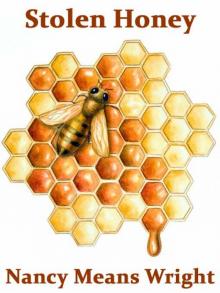 Stolen Honey
Stolen Honey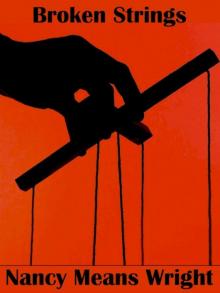 Broken Strings
Broken Strings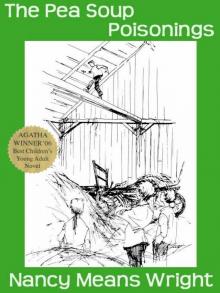 The Pea Soup Poisonings
The Pea Soup Poisonings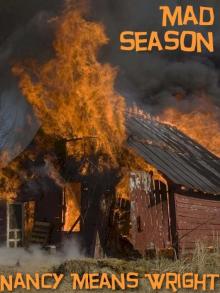 Mad Season
Mad Season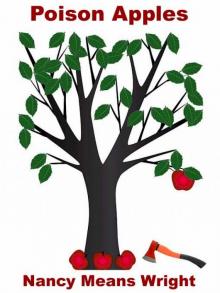 Poison Apples
Poison Apples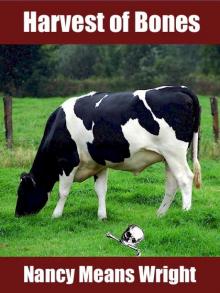 Harvest of Bones
Harvest of Bones